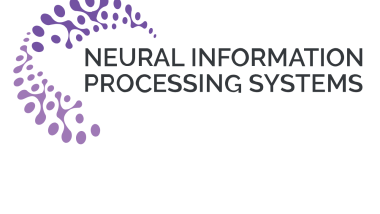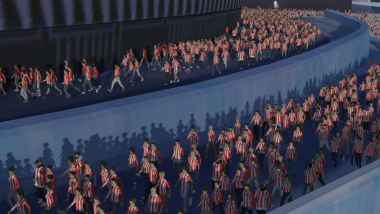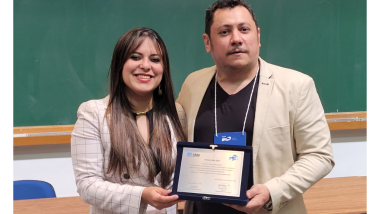EKIOCEAN concludes two years of research into sustainable solutions for floating marine photovoltaics
EKIOCEAN Project Concludes Two Years of Research on Sustainable Solutions for Floating Marine Photovoltaics
- The EKIOCEAN project, coordinated by TECNALIA and developed in collaboration with AZTI, BCAM, UPV/EHU — through the ITSAS REM and POLYMAT research groups — and BASQUENERGY Cluster, has conducted two years of research and knowledge generation on the development of sustainable solutions for floating photovoltaic (FPV) installations in marine environments, combining advanced technologies in materials, structures, and environmental assessment.
The EKIOCEAN project, coordinated by TECNALIA and developed in collaboration with AZTI, BCAM, UPV/EHU — through the ITSAS REM and POLYMAT research groups — and BASQUENERGY Cluster, has conducted two years of research and knowledge generation on the development of sustainable solutions for floating photovoltaic (FPV) installations in marine environments, combining advanced technologies in materials, structures, and environmental assessment.
Main Results Achieved
During the two years of the EKIOCEAN project, two conceptual designs for floating photovoltaic (FPV) plants have been defined and analyzed, aimed at implementation in both protected coastal areas (nearshore) and open-sea locations (offshore), taking into account the extreme conditions of the marine environment, such as waves, wind, and currents. Both designs have been developed to address key technical challenges such as overtopping, ensuring the structures follow the wave without excessive immersion, and mismatching, ensuring the modules maintain a stable orientation to minimize performance losses due to rotation.
To this end, work has been done with virtual and physical models, developing a specific methodology to analyze the hydrodynamic behavior of FPV systems, both in simulations and in the real 25-meter testing channel at UPV/EHU.
Another fundamental axis of the project has been research into new materials for the floating structures, aiming to improve their resistance and durability in the marine environment. Sustainable solutions based on ultra-high-performance concrete (UHPC) reinforced with polymeric fibers have been developed, showing good mechanical behavior and high resistance to chemical degradation after one year of exposure in saline conditions.
At the same time, new bio-based latexes with hydrophobic and antifouling properties have been successfully synthesized, used in coatings that have shown good adhesion to UHPC and reduced biomass under real conditions.
Furthermore, EKIOCEAN has thoroughly analyzed how the conditions of the marine environment affect the performance and degradation of photovoltaic modules, considering factors such as exposure to saltwater, abrupt wave movements, or dirt accumulation. The consortium has evaluated the behavior of different panel models with various cell technologies and encapsulation materials, finding that while degradation processes are detected, they are less significant than initially expected.
Additionally, a heterogeneous plant model has been validated, allowing the quantification of losses due to mismatching and providing a more precise analysis of the effects of mismatching, as well as the specific needs regarding wiring, operation, and maintenance of floating structures.
Finally, the project has also addressed the environmental impact of deploying FPV installations in marine environments, aiming to facilitate planning that is compatible with both the ecosystem and the various uses of maritime space. In this context, a methodological guide for the environmental approval of future projects has been developed, along with a freely accessible digital tool that allows for the identification of potential locations for floating plants at sea. This tool integrates key data on seabed characteristics, proximity to electrical and port infrastructures, presence of protected areas, and maritime activity intensity.
Throughout the project, the partners have been supported by an Advisory Committee composed of the companies Alerion, Branka, Isigenere, RDC, and Zelestra, who have assessed the technological advancements made and provided their opinions and recommendations to guide the research toward addressing the sector's needs.
Reflections and Next Steps
During the workshop, the participating companies agreed that floating marine photovoltaics have potential, though significant technological development is still required. It was noted that current solutions for onshore waters, such as reservoirs, are not applicable at sea, and the structures will need to be completely redesigned.
Opportunities for advancement were also discussed, such as exploring protected locations near ports or combining floating photovoltaics with other technologies like offshore wind. Overall, the project has generated valuable knowledge, laying a solid foundation for future developments.
About EKIOCEAN
The research conducted and the results presented in the session are part of the Elkartek EKIOCEAN project, "New Sustainable Concepts for Floating Photovoltaic Plants for the Marine Environment," coordinated by TECNALIA, in collaboration with AZTI, BCAM, UPV/EHU — through the ITSAS REM and POLYMAT research groups — and BASQUENERGY Cluster. The project is funded by the Elkartek 2023 program of the Department of Economic Development, Sustainability, and Environment of the Basque Government.
Related news
Eventos, Sobre el centro
Segunda edición del Encuentro de Dinámica de Fluidos Matemática celebrado en BCAM
Investigación



